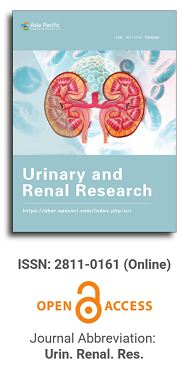
Asia Pacific Academy of Science Pte. Ltd. (APACSCI) specializes in international journal publishing. APACSCI adopts the open access publishing model and provides an important communication bridge for academic groups whose interest fields include engineering, technology, medicine, computer, mathematics, agriculture and forestry, and environment.
Renal involvement is one of the main causes of morbidity and mortality in patients with Systemic Lupus Erythematous. Lupus Nephropathy should be detected early. Albuminuria may be the only finding in the early stage of kidney disease. An observational, descriptive and retrospective study was carried out to determine the presence of Albuminuria (> 30 mg/24 h) in 60 patients with SLE who were admitted to the Rheumatology Service of the “10 de Octubre” Surgical Clinical Hospital, between October 2013 and September 2014. Albuminuria was observed to increase with increasingly pronounced drops in Glomerular Filtration (predicted according to the equation used in the MDRD Study). A significant statistical association was also obtained between albuminuria and disease evolution time: the longer the disease evolution time, the greater the albuminuria observed. Albuminuria is frequent in patients with SLE, its values being directly proportional to the time of evolution of the disease. This did not occur with the Glomerular Filtration, which remained relatively constant for any time of disease evolution.
Renal lithiasis is an infrequent entity in childhood and its incidence is increasing in developed countries. It affects white individuals more than African-Americans in a 4:1 ratio, with male predominance. There are geographical, racial and genetic factors involved in its pathogenesis, which also depends on physicochemical factors (renal elimination of water and solutes, urinary pH, balance between factors that stimulate/inhibit crystallization), anatomical alterations, infections and socioeconomic changes; which over time have produced changes in dietary habits, which have modified the frequency, chemical composition and location of calculi. Despite its rarity, lithiasis should be considered in order to avoid irreversible renal damage. The availability of less aggressive therapy has reduced surgical indications to 5%, opening new perspectives in the treatment of urolithiasis in childhood.
Usually, the kidneys can be affected by renal masses or space-occupying lesions (LOE). When reference is made to the term renal mass, all benign and malignant processes that occupy, distort and affect the renal parenchyma and its environment are included, regardless of etiology, shape and volume. Therefore, renal masses include all cystic formations (abscesses), calculi, pseudotumors, neoplasms, inflammatory diseases and traumatic lesions. Thus, for the evaluation of cystic renal masses in medical imaging, according to their characteristics such as their wall (thin, irregular, thickened), septa (thin, irregular, thickened), borders (defined or not) and size, classifications such as Bosniak's classification shown in Table 1 are used, which classifies renal cysts into five categories based on the appearance of the image, to help predict whether it is a benign or malignant tumor.
Objective Accurate preoperative differential diagnosis of fat⁃poor angiomyolipoma (fp⁃AML) and clear cell renal cell carcinoma (ccrcc) is essential for proper treatment planning. In order to increase the accuracy of discrimination of fp⁃AML from ccrcc, we develop a classification model based on radiomics technology. Methods The study retrospectively collected CT images of 18 cases with fp⁃AML and 42 cases with ccrcc from department of radiology, the Second Affiliated Hospital of Suzhou University. Firstly, 430 radiomics features were extracted from CT images. Then, the feature selection was carried by three steps: Pearson’s correlation matrices were calculated to remove redundant features, Welch’s t⁃test was utilized to determine the statistically significant features, and sequential forward floating selection method was used to select the discriminative features. Finally, k⁃nearest neighborhood, random forest, support vector machine and adaboost classifiers were built for classification. Results The model built by SVM classifier achieved the best classification performance, with accuracy, sensitivity, specificity, positive predictive value, negative predictive value, and area under the receiver operating characteristic curves of 91.67%, 88.89%, 92.86%, 84.21%, 95.12%, and 0.9418. Conclusions The proposed model can increase the classification accuracy of discrimination of fp⁃AML from ccrcc, and has great potential in helping radiologists to discriminate fp⁃AML from ccrcc.
Chronic kidney disease (CKD) affects 10%–13% of the global population, necessitating innovative treatments. Empagliflozin, a sodium-glucose cotransporter 2 (SGLT2) inhibitor, shows promise by reducing glycated hemoglobin and benefiting kidney and cardiovascular health. By spotlighting renoprotective mechanisms like glucose control and anti-inflammatory effects, insights from trials such as EMPA-REG OUTCOME unveil decreased kidney disease progression, improved eGFR, and reduced albuminuria with empagliflozin. Safety profiles and comparisons: Evaluating safety profiles, potential adverse events, and comparisons with other SGLT2 inhibitors provides a nuanced perspective on the therapeutic potential of empagliflozin. The review emphasizes the importance of diverse CKD population studies, continuous safety monitoring, and exploring SGLT2 inhibitors in specific demographics. In summary, empagliflozin emerges as a versatile therapeutic option in the SGLT2 inhibitor class for CKD, reshaping disease management. Final thoughts: Ongoing research and vigilant monitoring are crucial for maximizing the potential of SGLT2 inhibitors, especially empagliflozin, to enhance patient well-being in CKD.
.png)
Prof. Wei-Yen Hsu
National Chung Cheng University, Taiwan


 Open Access
Open Access